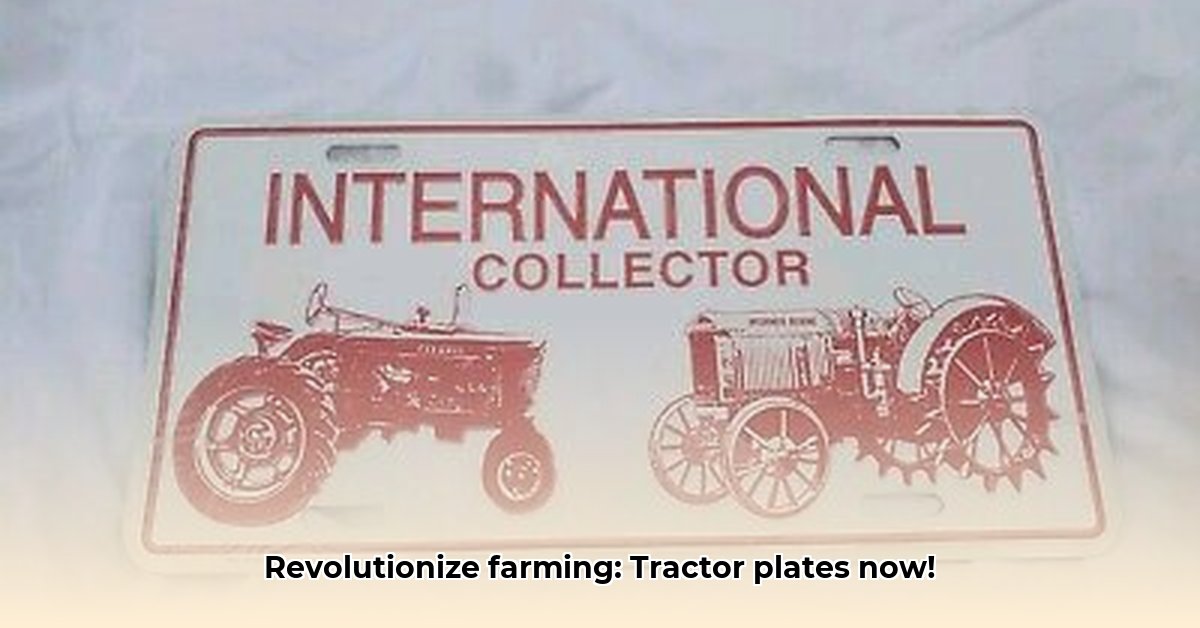
Understanding Tractor Plates: More Than Just Decoration
Tractor plates are custom-made metal plates (typically steel or aluminum) attached to tractors and other farm equipment. They serve multiple purposes, from clear ownership identification to adding a personalized touch. Beyond aesthetics, they significantly improve farm organization, preventing equipment mix-ups and streamlining workflows. Did you know that clearly marked plates can save you an average of 15 minutes per day searching for equipment? That's almost an hour a week! This seemingly small detail significantly boosts overall farm efficiency.
Types of Tractor Plates: Material and Design Considerations
Selecting the right tractor plates requires considering material and design. The most common materials are:
- Steel: Durable and strong, steel plates withstand considerable wear and tear. However, they are susceptible to rust without proper maintenance.
- Aluminum: Lighter than steel, making them easier to handle and attach. Aluminum offers good corrosion resistance. While less durable than steel, they're a viable, often more cost-effective, option.
- Stainless Steel: The premium choice offering superior corrosion resistance and unparalleled durability. However, this longevity comes at a higher price point.
Beyond material, consider size and design. Simple plates with numbers are practical; more elaborate designs featuring logos or custom artwork offer a personalized touch. The design possibilities are extensive, offering opportunities for brand alignment.
Where to Purchase Tractor Plates: Online and Offline Options
Several avenues exist for purchasing tractor plates:
- Online Retailers (Amazon, Etsy): Offer wide selections with varying designs, materials, and prices. Convenience is a major advantage, but personalized assistance is limited.
- Agricultural Supply Stores: Often carry curated selections alongside other farm supplies. In-person expert advice helps those unsure of their needs.
- Local Metal Fabricators: Ideal for fully customized plates. Work directly with a fabricator to create unique designs and sizes tailored to specifications, though this is generally the most expensive option.
Choosing the best option depends on your budget, need for personalization, and the value you place on convenience and expert advice.
Installing and Using Tractor Plates: A Step-by-Step Guide
Installing tractor plates is generally straightforward. Most utilize screws or rivets for attachment. Follow these steps for optimal results:
- Clean the Surface: Ensure the attachment area is clean and dry for a secure bond and to prevent rust.
- Choose Appropriate Fasteners: Select screws or rivets suitable for both the plate material and the tractor's surface. Using inappropriate fasteners can lead to failure.
- Careful Placement: Position the plate for maximum visibility without interfering with moving parts. Optimal placement ensures easy identification and prevents damage.
With proper installation, the plates remain secure and clearly identify your equipment.
Maintaining Your Tractor Plates: Extending Their Lifespan
Proper care significantly extends the lifespan of your tractor plates. Implement these maintenance practices:
- Regular Cleaning: Regularly remove dirt and debris to minimize corrosion and maintain aesthetics. This is crucial, regardless of the material used.
- Protective Coatings: Apply a rust-preventative coating to steel plates for added protection against the elements.
- Proper Storage: Store plates in a dry place when not in use, especially during off-seasons, to prevent rust and corrosion.
These simple steps will prolong functionality and aesthetic appeal.
Conclusion: Enhancing Farm Organization and Efficiency
While seemingly minor, tractor plates significantly impact farm efficiency. Clearly labeled tractors simplify tasks, reduce confusion, and save valuable time, ultimately leading to a streamlined and more organized farm operation. The initial investment in tractor plates translates to substantial improvements in workflow and time management. Consider them a wise investment in the long-term success of your farm.